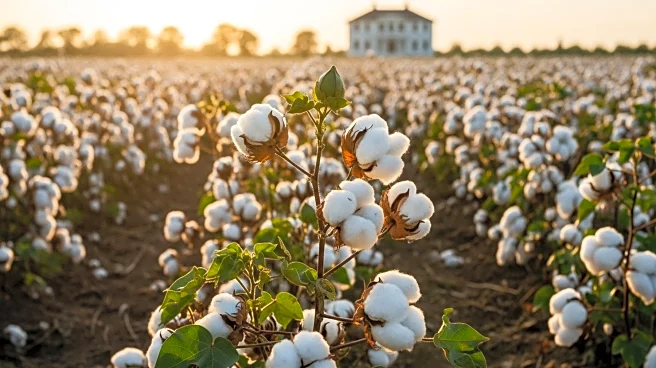What's Happening?
The National Cotton Council has expressed approval for the One Big Beautiful Bill Act, which addresses several priorities for the U.S. cotton industry. The act includes increased reference prices and payment limits for Upland cotton farmers, as well as the restoration of the Pima Trust Fund to $16 million to aid in marketing U.S. Pima cotton. Additionally, loans for extra-long staple cotton will be aligned with those for Upland growers. The council is also launching a campaign to educate consumers on the environmental impacts of synthetic clothing fibers, which contribute to microplastic pollution. This initiative aims to boost demand for natural cotton fibers, which are environmentally friendly.
Why It's Important?
The policy changes and consumer education efforts are significant for the U.S. cotton industry, as they could lead to increased demand for cotton products. By highlighting the environmental benefits of natural cotton over synthetic fibers, the industry hopes to shift consumer preferences, potentially increasing market share for U.S. cotton farmers. This could result in economic benefits for the cotton sector, supporting farmers and related businesses. The restoration of the Pima Trust Fund and adjustments in payment limits are crucial for maintaining the competitiveness of U.S. cotton in global markets.
What's Next?
The National Cotton Council's campaign against synthetic microfibers is expected to gain traction, leveraging media stories to inform consumers about the health and environmental risks associated with microplastics. As awareness grows, the cotton industry anticipates a shift in consumer behavior towards natural fibers, potentially leading to policy discussions on environmental standards for clothing production. The industry may also explore further traceability programs to enhance consumer trust and promote U.S.-grown cotton.
Beyond the Headlines
The focus on microplastics and synthetic fibers highlights broader environmental and health concerns, potentially influencing future regulatory measures in the textile industry. The cotton industry's proactive stance may set a precedent for other agricultural sectors to address sustainability and consumer education, fostering a more environmentally conscious market.










